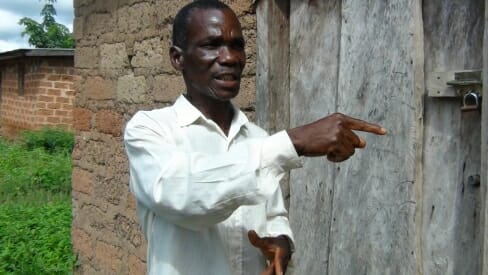
Sep 5, 2015 | Focolare Worldwide
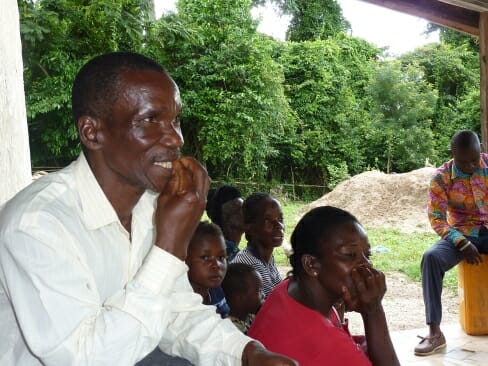 Seven kilometres into the forest, reachable on foot or by baka (van), which is the only thing capable of travelling over the mud and holes during the rainy season, lies the village of Glolé. It is one of eighteen Cantons in the region of Tonkpi, northwest of the Ivory Coast. There is no electricity, and therefore no television, internet or shops. Many of the people in that region have been touched by Chiara Lubich’s ideal of brotherhood. They live it in their daily lives beginning with putting into practice the Word of the Gospel; even the social and political structures have been gradually enriched and illuminated by the experience. Gilbert Gba Zio is a community leader, catechist and head of a family: “One day we asked ourselves what we should do for our little village,” he said during a recent meeting of the Economy of Communion in Nairobi, Kenya. “We saw that living out the Word of the Gospel could provide some guidelines.” Here are some of the concrete results of that decision. House for the strangers (guests). For Glolé the local saying “Kwayeko,” (We have a place for you to stay), was not merely a saying. “There are many people who walk through our area, they walk many miles and have sleep on the roadside until they reach their destination village. We always give our bed to our guests every time. This is also the Gospel’s way, but we said to ourselves: “Couldn’t we do more? Why don’t we build small houses, so when anybody arrives, we can offer them somewhere to sleep? So we began to make bricks, singing songs of joy. There were some bricklayers in our group and we built twelve small houses with one bedroom and a small living room in each. Now we can say to the strangers who arrive: “We have a house, come and sleep there. There is always some food, too, since we are all farmers. In this way, we took the first steps.
Seven kilometres into the forest, reachable on foot or by baka (van), which is the only thing capable of travelling over the mud and holes during the rainy season, lies the village of Glolé. It is one of eighteen Cantons in the region of Tonkpi, northwest of the Ivory Coast. There is no electricity, and therefore no television, internet or shops. Many of the people in that region have been touched by Chiara Lubich’s ideal of brotherhood. They live it in their daily lives beginning with putting into practice the Word of the Gospel; even the social and political structures have been gradually enriched and illuminated by the experience. Gilbert Gba Zio is a community leader, catechist and head of a family: “One day we asked ourselves what we should do for our little village,” he said during a recent meeting of the Economy of Communion in Nairobi, Kenya. “We saw that living out the Word of the Gospel could provide some guidelines.” Here are some of the concrete results of that decision. House for the strangers (guests). For Glolé the local saying “Kwayeko,” (We have a place for you to stay), was not merely a saying. “There are many people who walk through our area, they walk many miles and have sleep on the roadside until they reach their destination village. We always give our bed to our guests every time. This is also the Gospel’s way, but we said to ourselves: “Couldn’t we do more? Why don’t we build small houses, so when anybody arrives, we can offer them somewhere to sleep? So we began to make bricks, singing songs of joy. There were some bricklayers in our group and we built twelve small houses with one bedroom and a small living room in each. Now we can say to the strangers who arrive: “We have a house, come and sleep there. There is always some food, too, since we are all farmers. In this way, we took the first steps. 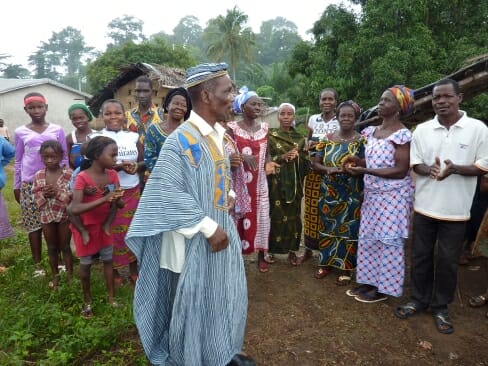 House of Health. During the rainy season it is difficult to reach the paved road and travel the additional 30 km to the city of Man, which is the closest urban centre. This makes it quite difficult in the case of a medical emergency. “One day there was a woman who was giving birth and it was a complicated labour,” Gilbert recounts. “We took her to the asphalt road in a wheelbarrow to get her in a car. Thank God, the woman was saved; but it was tough. Therefore it was necessary to build a house of health and bring some traditional midwives to help women in labour. But where to find the money? We have tenant farming in our region: the proprietor of a piece of land can give it to someone else to cultivate for one season. In the end, the harvest is divided in two equal parts and shared between them. Our community took a coffee plantation: the men pulled the weed out from among the plants, the women harvested the coffee. With the money we could buy the cement and build the House of Health.
House of Health. During the rainy season it is difficult to reach the paved road and travel the additional 30 km to the city of Man, which is the closest urban centre. This makes it quite difficult in the case of a medical emergency. “One day there was a woman who was giving birth and it was a complicated labour,” Gilbert recounts. “We took her to the asphalt road in a wheelbarrow to get her in a car. Thank God, the woman was saved; but it was tough. Therefore it was necessary to build a house of health and bring some traditional midwives to help women in labour. But where to find the money? We have tenant farming in our region: the proprietor of a piece of land can give it to someone else to cultivate for one season. In the end, the harvest is divided in two equal parts and shared between them. Our community took a coffee plantation: the men pulled the weed out from among the plants, the women harvested the coffee. With the money we could buy the cement and build the House of Health.  Children suffering from malnutrition. “There were children dying in the village and we did not know that we could actually save them. In the Focolare’s permanent Mariapolis, there is a centre taking care of them. We explained the problem to them and started bringing the children in. We were surprised to see that the children were getting healed in that place without any medications. They taught us how to feed them. One day, the head of the centre told us: ‘If you want, we can go to your place.’ In our culture a child belongs to the whole village! They explained to us how to prevent and how to cure this illness. We started to change our food related habits, and we learned that it is necessary to eat beans, peanuts, mushrooms . . . and we learned how to conserve food so we could give our children to eat even in times of famine.” Rice Bank. “We store the rice in smaller granaries, but they are frequently ‘visited’ by thieves and mice. So, we built a rammed earth house where everyone sent what they had. In the beginning, we were only 30 people. Nowadays, some farmers who are not members of our group have joined us, too, and 110 people are bringing their sacks of rice keep in our bank. In the months of March and April, during the sowing season, they take what they need for sowing and set aside what they need for feeding their children. At the right time, when the prices are good, they take away their rice and sell it. Everyone donates a part of their harvest according to their conscience and deposits it in the bank as a contribution to compensate for the needs of the community and for those who guard the rice bank.” One village is not enough. “‘Couldn’t you come to us with your business?’ the people of the neighbouring villages said to us. Today there are 13 villages that live like us in Glolé. Unity is our wealth. One day, there came an outside who wanted to help us make a well for the village. But we could not agree about the location of it. Had we insisted on having a well, it would have brought division to the village. So we preferred not to accept this gift in order to keep the unity amongst us. See “Economia di Comunione – una cultura nuova” n.41 – Eitorial insert from Città Nuova n.13/14 – 2015 – luglio 2015 See Nouvelle Cité Afrique Juillet 2015 Glolè (Ivory Coast): Congress EoC 2015
Children suffering from malnutrition. “There were children dying in the village and we did not know that we could actually save them. In the Focolare’s permanent Mariapolis, there is a centre taking care of them. We explained the problem to them and started bringing the children in. We were surprised to see that the children were getting healed in that place without any medications. They taught us how to feed them. One day, the head of the centre told us: ‘If you want, we can go to your place.’ In our culture a child belongs to the whole village! They explained to us how to prevent and how to cure this illness. We started to change our food related habits, and we learned that it is necessary to eat beans, peanuts, mushrooms . . . and we learned how to conserve food so we could give our children to eat even in times of famine.” Rice Bank. “We store the rice in smaller granaries, but they are frequently ‘visited’ by thieves and mice. So, we built a rammed earth house where everyone sent what they had. In the beginning, we were only 30 people. Nowadays, some farmers who are not members of our group have joined us, too, and 110 people are bringing their sacks of rice keep in our bank. In the months of March and April, during the sowing season, they take what they need for sowing and set aside what they need for feeding their children. At the right time, when the prices are good, they take away their rice and sell it. Everyone donates a part of their harvest according to their conscience and deposits it in the bank as a contribution to compensate for the needs of the community and for those who guard the rice bank.” One village is not enough. “‘Couldn’t you come to us with your business?’ the people of the neighbouring villages said to us. Today there are 13 villages that live like us in Glolé. Unity is our wealth. One day, there came an outside who wanted to help us make a well for the village. But we could not agree about the location of it. Had we insisted on having a well, it would have brought division to the village. So we preferred not to accept this gift in order to keep the unity amongst us. See “Economia di Comunione – una cultura nuova” n.41 – Eitorial insert from Città Nuova n.13/14 – 2015 – luglio 2015 See Nouvelle Cité Afrique Juillet 2015 Glolè (Ivory Coast): Congress EoC 2015
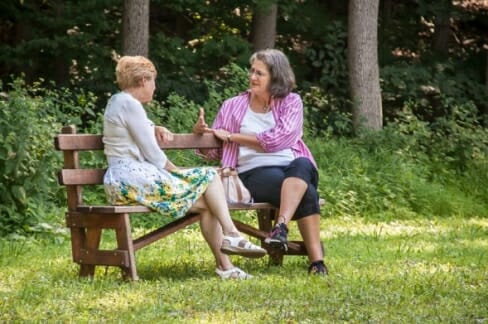
Sep 2, 2015 | Focolare Worldwide, Senza categoria
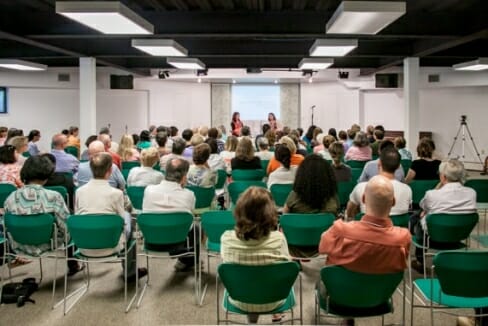 In 1998, Chiara Lubich established the Education for Dialogue Centre in Mariapolis Luminosa, the Focolare’s permanent Mariapolis in the State of New York. For that occasion she wrote: “May all those who take part in the activities of this centre also feel like builders of this new reality, collaborating with love, patience, mutual understanding and solidarity, in order to create an island of peace and a sign of unity for today’s world. . . may it especially be a school where one learns to live out this love, which is the only thing that can make the peoples of the earth a single family.” “These words from Chiara also informed a recent meeting of August 15 and 16 at the North American Mariapolis, titled: Dialogue and the Difficult Questions. It was attended by a hundred people and it focused on how to dialogue and communicate with people who think differently.”
In 1998, Chiara Lubich established the Education for Dialogue Centre in Mariapolis Luminosa, the Focolare’s permanent Mariapolis in the State of New York. For that occasion she wrote: “May all those who take part in the activities of this centre also feel like builders of this new reality, collaborating with love, patience, mutual understanding and solidarity, in order to create an island of peace and a sign of unity for today’s world. . . may it especially be a school where one learns to live out this love, which is the only thing that can make the peoples of the earth a single family.” “These words from Chiara also informed a recent meeting of August 15 and 16 at the North American Mariapolis, titled: Dialogue and the Difficult Questions. It was attended by a hundred people and it focused on how to dialogue and communicate with people who think differently.” 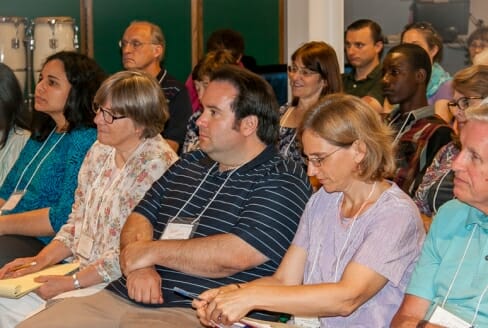 There were also very valuable contributions by four experts in moral theology and political theories from Fordham University (New York), Providence College (Rhode Island) and Georgetown University (Washington D.C.). They write: “We began with some words from Chiara Lubich on the dialogue that emerges particuarly from the spirituality of unity which, if practiced, helps to transform people’s relationships with eah other.” Charlie Camosy (Fordham) and Amy Uelman (Georgetown), examined the “reasons why USA society is so polarized by opposing positions and how the walls between people could be broken down by listening and being open to others.” Dana Dillon (Providence College) dealt with the delicate relationship between love and truth, based on one of the main points of the spirituality of unity: Jesus forsaken. The theologian presented Him as the true model of dialogue inasmuchh as “He entered into the disunity of that moment in which He felt abandoned by the Father, unifying the greatest division possible, the one between Heaven and earth.” In the afternoon there was an interactive programme offered by Claude Blanc, a leadership coach and team work consultant, who guided the participants in several exrecises in “learning to listen deeply and without pretexts.” A reflection on “Different Ways of Communicating” (imposing, discussing, trying to convince the other, and focusing on the common good), given by Bill Gould (Fordham),brought the session to a perfect conclusion.
There were also very valuable contributions by four experts in moral theology and political theories from Fordham University (New York), Providence College (Rhode Island) and Georgetown University (Washington D.C.). They write: “We began with some words from Chiara Lubich on the dialogue that emerges particuarly from the spirituality of unity which, if practiced, helps to transform people’s relationships with eah other.” Charlie Camosy (Fordham) and Amy Uelman (Georgetown), examined the “reasons why USA society is so polarized by opposing positions and how the walls between people could be broken down by listening and being open to others.” Dana Dillon (Providence College) dealt with the delicate relationship between love and truth, based on one of the main points of the spirituality of unity: Jesus forsaken. The theologian presented Him as the true model of dialogue inasmuchh as “He entered into the disunity of that moment in which He felt abandoned by the Father, unifying the greatest division possible, the one between Heaven and earth.” In the afternoon there was an interactive programme offered by Claude Blanc, a leadership coach and team work consultant, who guided the participants in several exrecises in “learning to listen deeply and without pretexts.” A reflection on “Different Ways of Communicating” (imposing, discussing, trying to convince the other, and focusing on the common good), given by Bill Gould (Fordham),brought the session to a perfect conclusion.  The roundtable discussion on Sunday, evidenced the need for being prepared to confront some current burning issues as well as the challenges of daily life. Two impressions: “The workshop on listening helped me to see how importnat and fruitful this can be in daily relationships;” “I leave quite enriched by this experience.”
The roundtable discussion on Sunday, evidenced the need for being prepared to confront some current burning issues as well as the challenges of daily life. Two impressions: “The workshop on listening helped me to see how importnat and fruitful this can be in daily relationships;” “I leave quite enriched by this experience.”
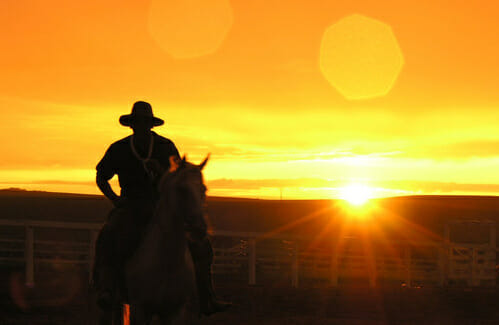
Aug 28, 2015 | Focolare Worldwide
 Every day around the world thousands of people stand up for an integral economy. Aldo Calliera is the owner of El Alba, a company inserted within the Economy of Communion, involved in the raising of livestock in Santiago, North Argentina. Work begins early for this country folk, even before the break of dawn. Before the day begins mate is prepared, a typical South American beverage that is meant to be sipped through a silver straw by a group of friends. With each new round, stories are shared and bodies warmed. The owner did not wish to lose this age old tradition of his guachos, and he began to attend the early morning materas, but he was surprised that with his arrival the conversation languished and silence fell on the assembly. It was the same every day. Guachos are reared in a culture where everyone falls silent when the boss arrives, not because of disappointment but because from the times of the Conquest the worker has been considered inferior to the master. Thus, Calliera went away each day feeling that he had been given a punch in the stomach, and his heart shrank at the thought at not having been able to penetrate the wall. Gradually his insistence enabled hearts to open and names be shared, all but one: Ernesto’s. One day, Calliera was programming “the service,” which is the time and location coupling for the production of calves. After the planning session the engineer who was with him, was about to issue orders to the workers, but Calliera stepped in saying: “Leave it to me, to talk to my men.” Then he explained to the workers what had to be done and, instead of simply giving them orders, he asked them for their opinion. Ernesto, whose voice the owner barely knew, spoke up for the first time: “I think that we won’t have any calves next year.” Calliera was doubly surprised and asked why. The answer was simple: there was not enough water for all the animals at the place where he had planned to take them for mating. It might seem that anyone could have said it, but in this culture it is customary to respond “Yes, sir” to one’s boss, even when you disagree. Callieri relects: “Then I realised that it is only by having an optimistic vision of others that you can draw out the best in them. Only in this way is it possible to find treasures in others that otherwise remain hidden, and to discover the best way to draw them out. Each person’s talents are like virtues that you discover when there is mutual trust.” Needless to say, the Callieri heard Ernesto’s advice and changed the “service” and things went better. . . The matera had produced a small cultural change that helped everyone to build relationships based on reciprocity that neither workers, nor forefathers would ever have immagined. Source: EoC online
Every day around the world thousands of people stand up for an integral economy. Aldo Calliera is the owner of El Alba, a company inserted within the Economy of Communion, involved in the raising of livestock in Santiago, North Argentina. Work begins early for this country folk, even before the break of dawn. Before the day begins mate is prepared, a typical South American beverage that is meant to be sipped through a silver straw by a group of friends. With each new round, stories are shared and bodies warmed. The owner did not wish to lose this age old tradition of his guachos, and he began to attend the early morning materas, but he was surprised that with his arrival the conversation languished and silence fell on the assembly. It was the same every day. Guachos are reared in a culture where everyone falls silent when the boss arrives, not because of disappointment but because from the times of the Conquest the worker has been considered inferior to the master. Thus, Calliera went away each day feeling that he had been given a punch in the stomach, and his heart shrank at the thought at not having been able to penetrate the wall. Gradually his insistence enabled hearts to open and names be shared, all but one: Ernesto’s. One day, Calliera was programming “the service,” which is the time and location coupling for the production of calves. After the planning session the engineer who was with him, was about to issue orders to the workers, but Calliera stepped in saying: “Leave it to me, to talk to my men.” Then he explained to the workers what had to be done and, instead of simply giving them orders, he asked them for their opinion. Ernesto, whose voice the owner barely knew, spoke up for the first time: “I think that we won’t have any calves next year.” Calliera was doubly surprised and asked why. The answer was simple: there was not enough water for all the animals at the place where he had planned to take them for mating. It might seem that anyone could have said it, but in this culture it is customary to respond “Yes, sir” to one’s boss, even when you disagree. Callieri relects: “Then I realised that it is only by having an optimistic vision of others that you can draw out the best in them. Only in this way is it possible to find treasures in others that otherwise remain hidden, and to discover the best way to draw them out. Each person’s talents are like virtues that you discover when there is mutual trust.” Needless to say, the Callieri heard Ernesto’s advice and changed the “service” and things went better. . . The matera had produced a small cultural change that helped everyone to build relationships based on reciprocity that neither workers, nor forefathers would ever have immagined. Source: EoC online
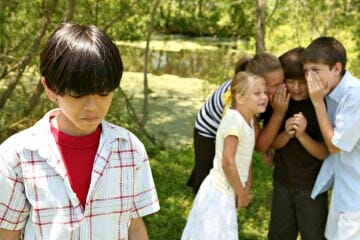
Aug 27, 2015 | Focolare Worldwide, Senza categoria
An illness 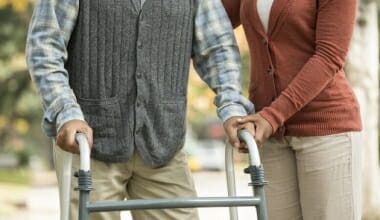 My husband has been ill for two years now because of a brain tumour. At times he complains because objects fall from his hands. I made an agreement with my daughters to never make him feel that something strange has happened. Many times, upon discreetly observing how they treat their father with care, and aware of the sacrifices and many renunciations they undertake to help the family, I see that they are more mature for their age. We are undergoing as a family, a period we have never experienced before. Despite the inexpressible suffering weighing on us, we feel a great serenity. (B.S. – Poland) The old man There was no more food in the house. I took a bag of cornmeal and 1,000 francs: half for transportation and the other half for the mill. I hailed the first taxi that came by. Beside the taxi driver, an old man was profoundly asleep. I noticed that the taxi driver was trying to slip the man’s wallet from his bag, so when I arrived at my destination I said: «This is my father, and he has to get off with me.» The driver continued to say that this was not where the man wanted to go, but due to my insistence, said he would let the man get off for 1,000 francs. I gave it to him immediately, and taking the bag, I helped the old man, still asleep, get off. Over here it occurs often that taxi drivers drug people in order to rob them. The old man awoke when I poured water over his head. He looked for his bag and checked if all his money was there. He said to me: “You saved my life”, and gave me 5,000 francs. I looked for a taxi driver I trusted who accompanied him safe and sound to his village. (M.A. – Cameroon)
My husband has been ill for two years now because of a brain tumour. At times he complains because objects fall from his hands. I made an agreement with my daughters to never make him feel that something strange has happened. Many times, upon discreetly observing how they treat their father with care, and aware of the sacrifices and many renunciations they undertake to help the family, I see that they are more mature for their age. We are undergoing as a family, a period we have never experienced before. Despite the inexpressible suffering weighing on us, we feel a great serenity. (B.S. – Poland) The old man There was no more food in the house. I took a bag of cornmeal and 1,000 francs: half for transportation and the other half for the mill. I hailed the first taxi that came by. Beside the taxi driver, an old man was profoundly asleep. I noticed that the taxi driver was trying to slip the man’s wallet from his bag, so when I arrived at my destination I said: «This is my father, and he has to get off with me.» The driver continued to say that this was not where the man wanted to go, but due to my insistence, said he would let the man get off for 1,000 francs. I gave it to him immediately, and taking the bag, I helped the old man, still asleep, get off. Over here it occurs often that taxi drivers drug people in order to rob them. The old man awoke when I poured water over his head. He looked for his bag and checked if all his money was there. He said to me: “You saved my life”, and gave me 5,000 francs. I looked for a taxi driver I trusted who accompanied him safe and sound to his village. (M.A. – Cameroon)  Trendy pants My classmates made fun of me because I didn’t have trendy clothes. I have a big family and we live in the countryside. One day I helped a classmate who was having a hard time with math and we became friends. Another day the others started to joke about my pants and he defended me. From that time on, all this stopped. We need to be at least two to be able to fight wrong ideas. In a short time we all became friends, and when they had to choose the class leader, they chose me. (E.C. – Italy) The beggar In my community we pray daily to God to bless our food, and help us to share it with those in need. At lunch time the usual beggar knocked on the door and we had nothing but cornmeal porridge for lunch and dinner. We did not have any money either, so I told the beggar that we did not have anything. When I sat down for lunch, I had no appetite. After a while, a phrase came to my mind, “Give and you will be given.” So I gathered what we had and gave it to the beggar who was still waiting. Not long after that, someone knocked on the door. A girl was there holding a big plate of cornmeal porridge saying: «This is from mama». It’s incredible how God is so punctual. (Sister Madeleine – Burkina Faso)
Trendy pants My classmates made fun of me because I didn’t have trendy clothes. I have a big family and we live in the countryside. One day I helped a classmate who was having a hard time with math and we became friends. Another day the others started to joke about my pants and he defended me. From that time on, all this stopped. We need to be at least two to be able to fight wrong ideas. In a short time we all became friends, and when they had to choose the class leader, they chose me. (E.C. – Italy) The beggar In my community we pray daily to God to bless our food, and help us to share it with those in need. At lunch time the usual beggar knocked on the door and we had nothing but cornmeal porridge for lunch and dinner. We did not have any money either, so I told the beggar that we did not have anything. When I sat down for lunch, I had no appetite. After a while, a phrase came to my mind, “Give and you will be given.” So I gathered what we had and gave it to the beggar who was still waiting. Not long after that, someone knocked on the door. A girl was there holding a big plate of cornmeal porridge saying: «This is from mama». It’s incredible how God is so punctual. (Sister Madeleine – Burkina Faso)
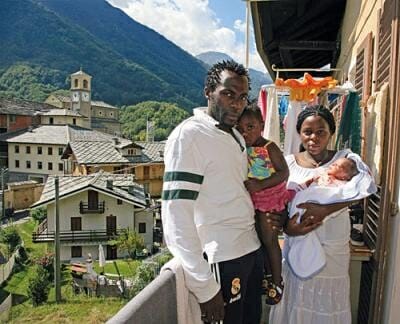
Aug 26, 2015 | Focolare Worldwide
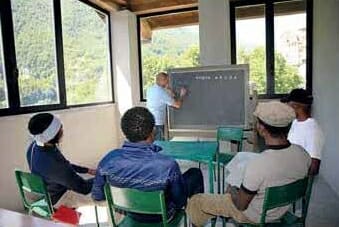 Five years ago, the town was classified as having one of the lowest socio-economic communities in the Piemonte region. But the entire community learned about hospitality towards others and today, 30 refugees, almost all Africans, besides a family from Kosovo with three children, have been living for eight months now, in a housing unit owned by the Cottolengo Institute. “We have adopted them,” confided two eighty year olds sitting in the town square. They had done so during the war, specified the President of the “Pro Loco” organisation, with the Jews and the members of the Italian resistance movement. History repeats itself. The mayor, Lisa Giacomo did not have to convince himself and the 180 residents of the village. Out of these, only 90 live in Lemie all year round. It had already happened in 2011, when the problem of hosting the migrants and refugees arriving on the Italian coasts with rusty boats still was not such a burning issue. Already then, for Lemie, that arrival of ‘friends’ had symbolized the rebirth of the community The 12 children taken care of by educators and the parish priest were baptised in the parish Church during a ceremony which went down in the history of the town. It was a feast. All the families with the children were welcomed by families and other children of those alpine valleys.
Five years ago, the town was classified as having one of the lowest socio-economic communities in the Piemonte region. But the entire community learned about hospitality towards others and today, 30 refugees, almost all Africans, besides a family from Kosovo with three children, have been living for eight months now, in a housing unit owned by the Cottolengo Institute. “We have adopted them,” confided two eighty year olds sitting in the town square. They had done so during the war, specified the President of the “Pro Loco” organisation, with the Jews and the members of the Italian resistance movement. History repeats itself. The mayor, Lisa Giacomo did not have to convince himself and the 180 residents of the village. Out of these, only 90 live in Lemie all year round. It had already happened in 2011, when the problem of hosting the migrants and refugees arriving on the Italian coasts with rusty boats still was not such a burning issue. Already then, for Lemie, that arrival of ‘friends’ had symbolized the rebirth of the community The 12 children taken care of by educators and the parish priest were baptised in the parish Church during a ceremony which went down in the history of the town. It was a feast. All the families with the children were welcomed by families and other children of those alpine valleys.  “Of course, at the start we were a bit surprised,” Lisa explained, “the population here has a a very high age bracket average, and it’s not easy to open oneself to others. Or at least, this was not the case. I didn’t have to give a lot of explanations since no one asked any questions. Giving hospitality seemed but a natural thing .” And the situation today is still the same as in 2011. And as in the past, the men and woman that arrived from Libya and other sub-Saharian countries will have to work, and make themselves useful. “With the Province of Turin in 2011 we had also implemented some job offers. Now some are applying for ‘restitution volunteer work’ which is useful to them and also to us.” the mayor remarked. And not only do these ‘refugee friends’ wish to stay in Italy, but the community itself is asking them to stay. “The citizens immediately accepted them, but what’s more, welcomed them,” confirmed Lisa, “and a couple of residents found jobs as educators with an association related to a cooperative. Problems? “Only bureaucratic ones. They applied for protection as refugees, but the time frames are very long.” Then the transportation issues: “I will ask the agencies managing the coaches for Turin to help them, since I think it would useless to make them pay the bus tickets for Turin.” On asking the mayor if the village has been reborn due to the migrants, he smiles and opens his arms . “Look at this valley. It is full of second homes, that open only in summer. Many young people continue to leave, even if their bond with valley is still strong. The new people who have come have brought some liveliness. Just go to the playground on a sunny afternoon and finally you will see children playing, shouting, enjoying themselves. They have even saved the school.” Excuse me? “Certainly. Five children more in school allowed the school to keep more teachers and a better quality in education. What else can we ask of these friends we have welcomed among us? The family has been extended and Lemie is no longer small and marginal. We want to be a different village, new and open to all.” Original article in Italian: Città Nuova online
“Of course, at the start we were a bit surprised,” Lisa explained, “the population here has a a very high age bracket average, and it’s not easy to open oneself to others. Or at least, this was not the case. I didn’t have to give a lot of explanations since no one asked any questions. Giving hospitality seemed but a natural thing .” And the situation today is still the same as in 2011. And as in the past, the men and woman that arrived from Libya and other sub-Saharian countries will have to work, and make themselves useful. “With the Province of Turin in 2011 we had also implemented some job offers. Now some are applying for ‘restitution volunteer work’ which is useful to them and also to us.” the mayor remarked. And not only do these ‘refugee friends’ wish to stay in Italy, but the community itself is asking them to stay. “The citizens immediately accepted them, but what’s more, welcomed them,” confirmed Lisa, “and a couple of residents found jobs as educators with an association related to a cooperative. Problems? “Only bureaucratic ones. They applied for protection as refugees, but the time frames are very long.” Then the transportation issues: “I will ask the agencies managing the coaches for Turin to help them, since I think it would useless to make them pay the bus tickets for Turin.” On asking the mayor if the village has been reborn due to the migrants, he smiles and opens his arms . “Look at this valley. It is full of second homes, that open only in summer. Many young people continue to leave, even if their bond with valley is still strong. The new people who have come have brought some liveliness. Just go to the playground on a sunny afternoon and finally you will see children playing, shouting, enjoying themselves. They have even saved the school.” Excuse me? “Certainly. Five children more in school allowed the school to keep more teachers and a better quality in education. What else can we ask of these friends we have welcomed among us? The family has been extended and Lemie is no longer small and marginal. We want to be a different village, new and open to all.” Original article in Italian: Città Nuova online
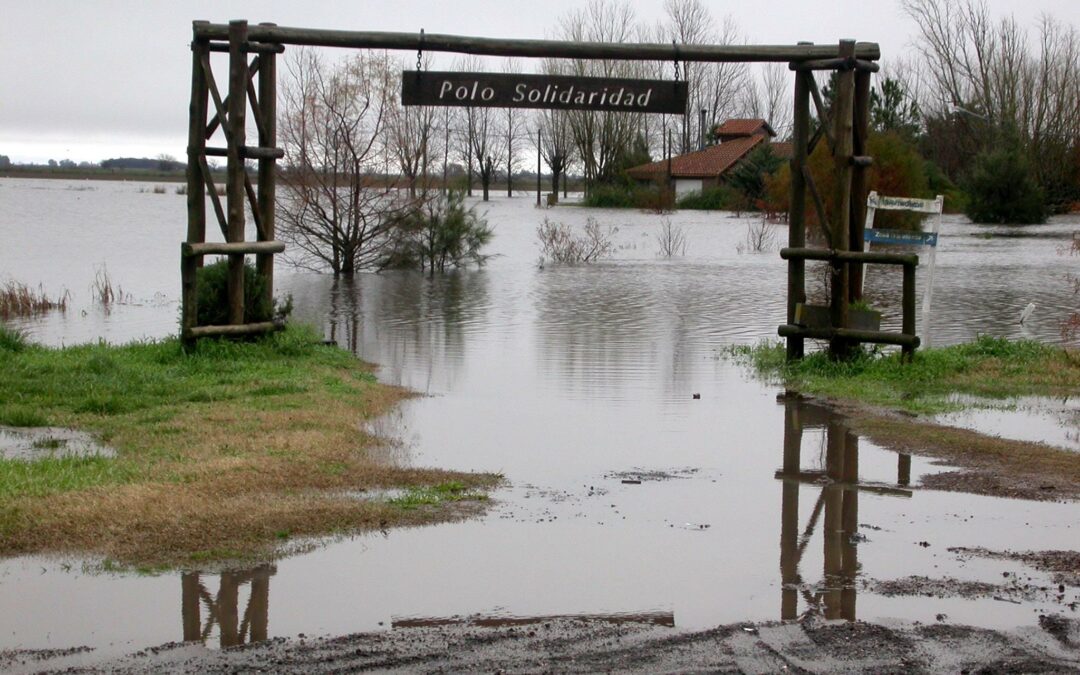
Aug 25, 2015 | Focolare Worldwide
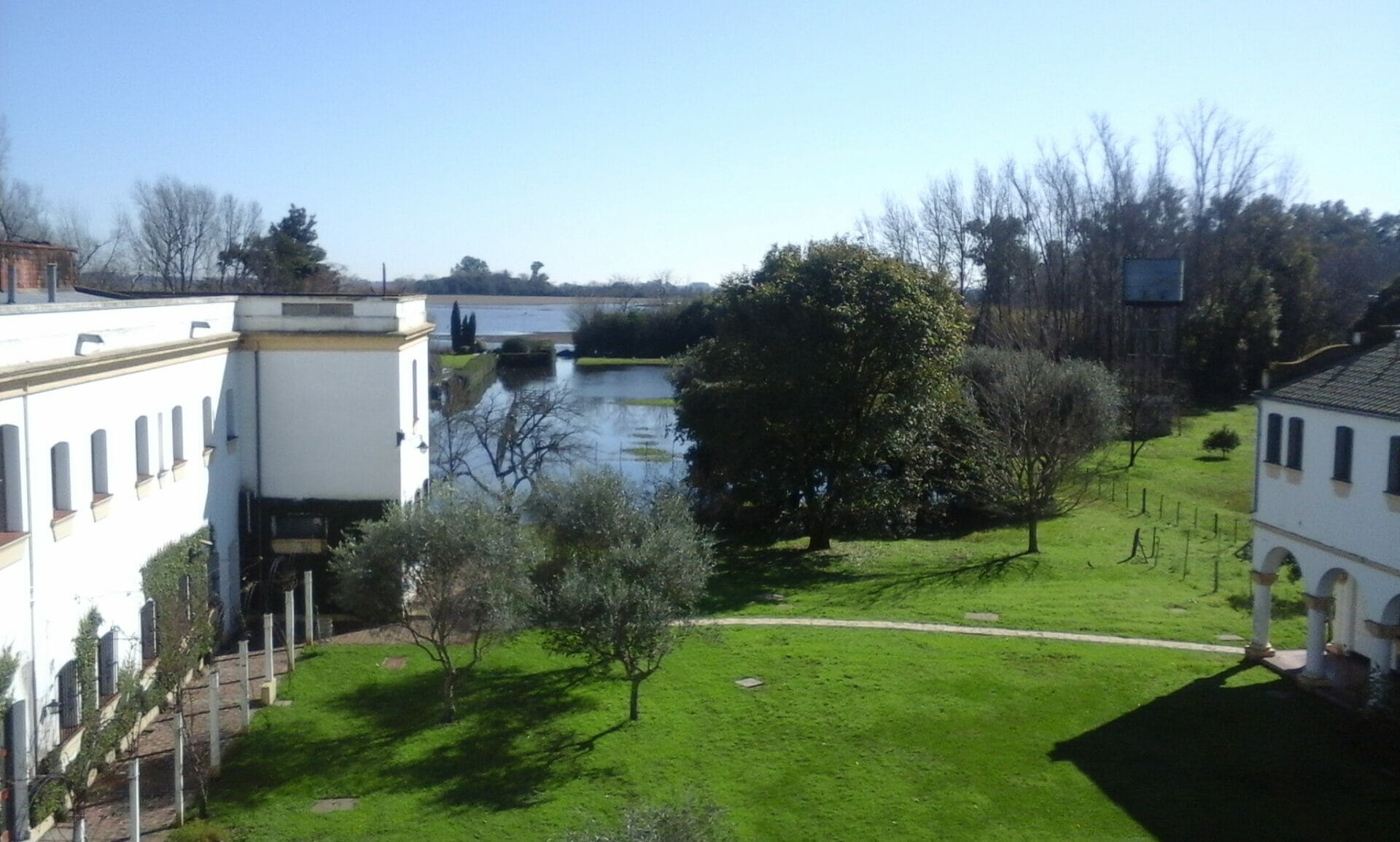 The Argentine provinces of Buenos Aires and Santa Fe were recently hit with severe rainfall. The local news media says that 20,000 people were affected and more than 4, 000 evacuees. Some roads are closed and others have limited access. The rains are unrelenting and a weather emergency is in force. However, in some regions the rain has begun to lessen. Mariapolis Lia, nestled in the Argentine pampas region, is literally submerged in water along with the Solidaridad Industrial Park where several Economy of Communion Businesses are located. “The water has flooded two buildings in the Park and also the garage of a third building,” Jorge Perrin writes from Solidad Industrial Park. Another two buildings are at risk: the water level has risen to a few centimetres. In the other buildings water has flooded the basements, but the living quarters are secure for the moment. The Primicias greenhouses along the road have also been flooded and the production completely lost, exept for a section of tomatoes. Pasticcino (coffee biscuits) is moving its production with the help of tractor from Primicias. For the moment the water has not flooded any of the dwellings in the Mariapolis itself.”
The Argentine provinces of Buenos Aires and Santa Fe were recently hit with severe rainfall. The local news media says that 20,000 people were affected and more than 4, 000 evacuees. Some roads are closed and others have limited access. The rains are unrelenting and a weather emergency is in force. However, in some regions the rain has begun to lessen. Mariapolis Lia, nestled in the Argentine pampas region, is literally submerged in water along with the Solidaridad Industrial Park where several Economy of Communion Businesses are located. “The water has flooded two buildings in the Park and also the garage of a third building,” Jorge Perrin writes from Solidad Industrial Park. Another two buildings are at risk: the water level has risen to a few centimetres. In the other buildings water has flooded the basements, but the living quarters are secure for the moment. The Primicias greenhouses along the road have also been flooded and the production completely lost, exept for a section of tomatoes. Pasticcino (coffee biscuits) is moving its production with the help of tractor from Primicias. For the moment the water has not flooded any of the dwellings in the Mariapolis itself.” 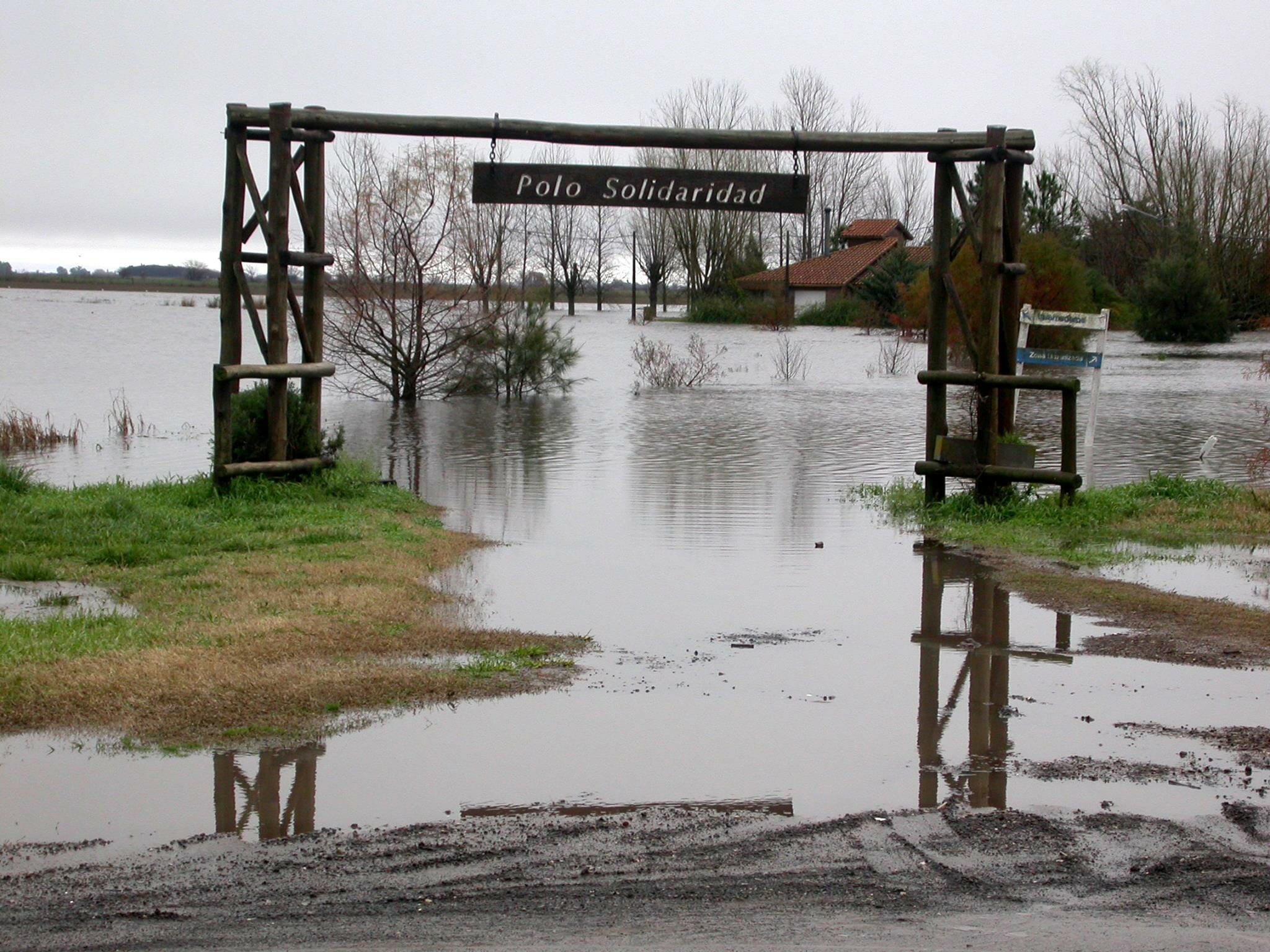 In many of the provinces of Buenos Aires the lagoons are connected with one another; the drainage channels are insufficient and the stretches of water become like oceans. “The channel of the Mariapolis and the Industrial Park had been cleaned recently and function well. But the problem of the road than links the Mariapolis to the nearby village is another story. It drains from another part. Access between the Mariapolis and the local village is completely flooded and it only possible to go from place to place in specialised vehicles.” “The solidarity amongst us is extraordinary,” he adds. The only automobiles capable of driving through the mud are the tractor and the Mariapolis van. So they’re always on the move transporting people to work, to school, to make purchases for others, or to take supplies to people, and so on. Throughout these days, in the countless telephone calls, in the communion amongst us, in the peaceful spirit with which we face every situation, I understand once again what a great family we are!” For enquiries on how to help.:polosolidaridad@gmail.com
In many of the provinces of Buenos Aires the lagoons are connected with one another; the drainage channels are insufficient and the stretches of water become like oceans. “The channel of the Mariapolis and the Industrial Park had been cleaned recently and function well. But the problem of the road than links the Mariapolis to the nearby village is another story. It drains from another part. Access between the Mariapolis and the local village is completely flooded and it only possible to go from place to place in specialised vehicles.” “The solidarity amongst us is extraordinary,” he adds. The only automobiles capable of driving through the mud are the tractor and the Mariapolis van. So they’re always on the move transporting people to work, to school, to make purchases for others, or to take supplies to people, and so on. Throughout these days, in the countless telephone calls, in the communion amongst us, in the peaceful spirit with which we face every situation, I understand once again what a great family we are!” For enquiries on how to help.:polosolidaridad@gmail.com

 Seven kilometres into the forest, reachable on foot or by baka (van), which is the only thing capable of travelling over the mud and holes during the rainy season, lies the village of Glolé. It is one of eighteen Cantons in the region of Tonkpi, northwest of the Ivory Coast. There is no electricity, and therefore no television, internet or shops. Many of the people in that region have been touched by Chiara Lubich’s ideal of brotherhood. They live it in their daily lives beginning with putting into practice the Word of the Gospel; even the social and political structures have been gradually enriched and illuminated by the experience. Gilbert Gba Zio is a community leader, catechist and head of a family: “One day we asked ourselves what we should do for our little village,” he said during a recent meeting of the Economy of Communion in Nairobi, Kenya. “We saw that living out the Word of the Gospel could provide some guidelines.” Here are some of the concrete results of that decision. House for the strangers (guests). For Glolé the local saying “Kwayeko,” (We have a place for you to stay), was not merely a saying. “There are many people who walk through our area, they walk many miles and have sleep on the roadside until they reach their destination village. We always give our bed to our guests every time. This is also the Gospel’s way, but we said to ourselves: “Couldn’t we do more? Why don’t we build small houses, so when anybody arrives, we can offer them somewhere to sleep? So we began to make bricks, singing songs of joy. There were some bricklayers in our group and we built twelve small houses with one bedroom and a small living room in each. Now we can say to the strangers who arrive: “We have a house, come and sleep there. There is always some food, too, since we are all farmers. In this way, we took the first steps.
Seven kilometres into the forest, reachable on foot or by baka (van), which is the only thing capable of travelling over the mud and holes during the rainy season, lies the village of Glolé. It is one of eighteen Cantons in the region of Tonkpi, northwest of the Ivory Coast. There is no electricity, and therefore no television, internet or shops. Many of the people in that region have been touched by Chiara Lubich’s ideal of brotherhood. They live it in their daily lives beginning with putting into practice the Word of the Gospel; even the social and political structures have been gradually enriched and illuminated by the experience. Gilbert Gba Zio is a community leader, catechist and head of a family: “One day we asked ourselves what we should do for our little village,” he said during a recent meeting of the Economy of Communion in Nairobi, Kenya. “We saw that living out the Word of the Gospel could provide some guidelines.” Here are some of the concrete results of that decision. House for the strangers (guests). For Glolé the local saying “Kwayeko,” (We have a place for you to stay), was not merely a saying. “There are many people who walk through our area, they walk many miles and have sleep on the roadside until they reach their destination village. We always give our bed to our guests every time. This is also the Gospel’s way, but we said to ourselves: “Couldn’t we do more? Why don’t we build small houses, so when anybody arrives, we can offer them somewhere to sleep? So we began to make bricks, singing songs of joy. There were some bricklayers in our group and we built twelve small houses with one bedroom and a small living room in each. Now we can say to the strangers who arrive: “We have a house, come and sleep there. There is always some food, too, since we are all farmers. In this way, we took the first steps.  House of Health. During the rainy season it is difficult to reach the paved road and travel the additional 30 km to the city of Man, which is the closest urban centre. This makes it quite difficult in the case of a medical emergency. “One day there was a woman who was giving birth and it was a complicated labour,” Gilbert recounts. “We took her to the asphalt road in a wheelbarrow to get her in a car. Thank God, the woman was saved; but it was tough. Therefore it was necessary to build a house of health and bring some traditional midwives to help women in labour. But where to find the money? We have tenant farming in our region: the proprietor of a piece of land can give it to someone else to cultivate for one season. In the end, the harvest is divided in two equal parts and shared between them. Our community took a coffee plantation: the men pulled the weed out from among the plants, the women harvested the coffee. With the money we could buy the cement and build the House of Health.
House of Health. During the rainy season it is difficult to reach the paved road and travel the additional 30 km to the city of Man, which is the closest urban centre. This makes it quite difficult in the case of a medical emergency. “One day there was a woman who was giving birth and it was a complicated labour,” Gilbert recounts. “We took her to the asphalt road in a wheelbarrow to get her in a car. Thank God, the woman was saved; but it was tough. Therefore it was necessary to build a house of health and bring some traditional midwives to help women in labour. But where to find the money? We have tenant farming in our region: the proprietor of a piece of land can give it to someone else to cultivate for one season. In the end, the harvest is divided in two equal parts and shared between them. Our community took a coffee plantation: the men pulled the weed out from among the plants, the women harvested the coffee. With the money we could buy the cement and build the House of Health.  Children suffering from malnutrition. “There were children dying in the village and we did not know that we could actually save them. In the Focolare’s permanent Mariapolis, there is a centre taking care of them. We explained the problem to them and started bringing the children in. We were surprised to see that the children were getting healed in that place without any medications. They taught us how to feed them. One day, the head of the centre told us: ‘If you want, we can go to your place.’ In our culture a child belongs to the whole village! They explained to us how to prevent and how to cure this illness. We started to change our food related habits, and we learned that it is necessary to eat beans, peanuts, mushrooms . . . and we learned how to conserve food so we could give our children to eat even in times of famine.” Rice Bank. “We store the rice in smaller granaries, but they are frequently ‘visited’ by thieves and mice. So, we built a rammed earth house where everyone sent what they had. In the beginning, we were only 30 people. Nowadays, some farmers who are not members of our group have joined us, too, and 110 people are bringing their sacks of rice keep in our bank. In the months of March and April, during the sowing season, they take what they need for sowing and set aside what they need for feeding their children. At the right time, when the prices are good, they take away their rice and sell it. Everyone donates a part of their harvest according to their conscience and deposits it in the bank as a contribution to compensate for the needs of the community and for those who guard the rice bank.” One village is not enough. “‘Couldn’t you come to us with your business?’ the people of the neighbouring villages said to us. Today there are 13 villages that live like us in Glolé. Unity is our wealth. One day, there came an outside who wanted to help us make a well for the village. But we could not agree about the location of it. Had we insisted on having a well, it would have brought division to the village. So we preferred not to accept this gift in order to keep the unity amongst us. See “Economia di Comunione – una cultura nuova” n.41 – Eitorial insert from Città Nuova n.13/14 – 2015 – luglio 2015 See Nouvelle Cité Afrique Juillet 2015 Glolè (Ivory Coast): Congress EoC 2015
Children suffering from malnutrition. “There were children dying in the village and we did not know that we could actually save them. In the Focolare’s permanent Mariapolis, there is a centre taking care of them. We explained the problem to them and started bringing the children in. We were surprised to see that the children were getting healed in that place without any medications. They taught us how to feed them. One day, the head of the centre told us: ‘If you want, we can go to your place.’ In our culture a child belongs to the whole village! They explained to us how to prevent and how to cure this illness. We started to change our food related habits, and we learned that it is necessary to eat beans, peanuts, mushrooms . . . and we learned how to conserve food so we could give our children to eat even in times of famine.” Rice Bank. “We store the rice in smaller granaries, but they are frequently ‘visited’ by thieves and mice. So, we built a rammed earth house where everyone sent what they had. In the beginning, we were only 30 people. Nowadays, some farmers who are not members of our group have joined us, too, and 110 people are bringing their sacks of rice keep in our bank. In the months of March and April, during the sowing season, they take what they need for sowing and set aside what they need for feeding their children. At the right time, when the prices are good, they take away their rice and sell it. Everyone donates a part of their harvest according to their conscience and deposits it in the bank as a contribution to compensate for the needs of the community and for those who guard the rice bank.” One village is not enough. “‘Couldn’t you come to us with your business?’ the people of the neighbouring villages said to us. Today there are 13 villages that live like us in Glolé. Unity is our wealth. One day, there came an outside who wanted to help us make a well for the village. But we could not agree about the location of it. Had we insisted on having a well, it would have brought division to the village. So we preferred not to accept this gift in order to keep the unity amongst us. See “Economia di Comunione – una cultura nuova” n.41 – Eitorial insert from Città Nuova n.13/14 – 2015 – luglio 2015 See Nouvelle Cité Afrique Juillet 2015 Glolè (Ivory Coast): Congress EoC 2015 










